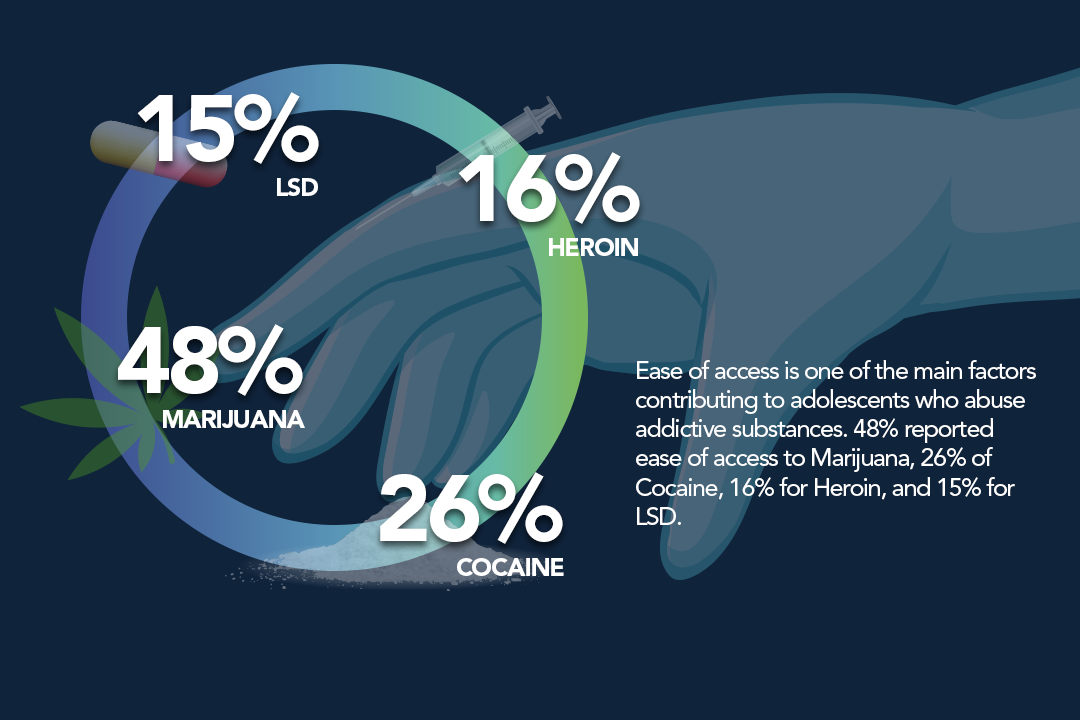The Benefits of an Inpatient Drug Rehab Center
There are many benefits of attending an inpatient drug rehab center. Continue reading to learn more.
Introduction
Addiction can negatively impact people’s lives in many ways. It is known to affect people mentally and physically. Unfortunately, 50-80% of people never seek treatment. That’s why knowing the benefits of sobriety and encouraging recovery is important.
Thankfully, there are many resources available that can help. If you’re struggling, researching the role of an inpatient drug rehab center is a great place to start. This article will review inpatient drug rehab center options, benefits, and resources available here at Essence Healthcare.

What is an Inpatient Drug Rehab Center?
Inpatient drug rehab involves staying at a treatment center for a duration of time while receiving treatment. An inpatient drug rehab center can provide the following:
- Detox services
- 1-on-1, group, or family therapy options
- Around-the-clock medical support
- A guided plan for recovery based on your needs.
- Tools to improve your well-being after finishing treatment.
- Other therapeutic options based on mindfulness, exercise, and other healthy habits.
You get all these aspects and more with inpatient drug rehab center. This makes it an excellent way to ensure successful recovery results.
What are the Benefits of an Inpatient Drug Rehab Center?
You will benefit from choosing an inpatient drug rehab center for recovery. This section will review each in detail to help you decide if inpatient recovery suits your needs.
It Makes the Detox Process Easier
The detox process is necessary for recovery, but it can be a tough process. You will likely experience withdrawal symptoms during this time that range from mild to severe. In case of severe symptoms, having a medical staff present will help to prevent any adverse health effects.
Another aspect you must consider is relapse. Unfortunately, studies have found that in the short-term, when someone is first in remission from addiction, 20-50% of people relapse.1 Many people relapse because they don’t have the right level of care and support. A well-structured inpatient drug rehab center will help reduce the chances of relapse significantly. Specifically, studies have found that a combination of more extended treatment and patients completing the full program results in lower relapse levels than short-term care.2
Community Support
Studies have shown that those who struggle with a substance use disorder are more likely to experience emotional and social loneliness. This not only affects their mental well-being but can worsen symptoms of addiction. The best way to counteract that is through positive community support in treatment.3
Structured Environment and Routine
The environment can factor into addiction rates and recovery. A common risk factor is the ease of access to addictive substances.
One study from the National Survey on Drug Use found that among adolescents who abused addictive substances, a high percentage reported ease of access as one of the main reasons they started using them. 48% reported ease of access to marijuana, 26% for cocaine, 16% for heroin, and 15% for LSD.4
Additional Positive Environmental Factors
Along with ease of access, other environmental factors can also contribute to addiction, such as:
- Being in an environment where drug use is prevalent.
- Trauma occurring within the environment.
- High stress levels from the environment
- Having a family history of substance abuse
- Lack of family support
All these factors can contribute to high environmental risk factors of addiction. Inpatient drug rehab can help by putting you in a structured environment. You will be away from distractions and can focus on recovery. You can also create a plan for long-term success that helps manage your environment after treatment.
Aftercare and Support After Treatment
A well-rounded treatment program, such as what is offered at our inpatient drug rehab center, will help you create a plan for long-term success and offer additional assistance after you finish treatment. Studies show that care centers that strongly try to provide support produce more positive results from treatment. Aftercare can include:5
- Checking in with patients after they have finished treatment.
- Referring to 12-step programs, therapy, or other resources outside the center
- Helping patients ease back into everyday life.
- Helping facilitate family support during treatment.
- Creating and managing a long-term plan for success with patients
All these aspects will make a big difference and be essential to recovery.
Treatment Programs Tailored for the Individual
An inpatient drug rehab center also stands out as an effective form of treatment since the rehab process can be tailored to everyone. That is especially true at treatment centers with a smaller maximum capacity.
Essence Healthcare offers a smaller, more individualized treatment process. Our facility isn’t big and overwhelming; it’s more personal and comfortable. The treatment process will be tailored toward you from the moment you start. Everyone is unique, and we make sure your treatment plan is too. This leads to higher success rates.
Multiple Therapies are Provided
One of the important aspects of individual treatment is multiple therapy options. Therapy is an essential aspect of a successful inpatient program. However, not everyone responds the same to therapy.
Some people respond best to 1-on-1 talk therapy, some respond better in group sessions, and others require more activity-based options. Whatever your needs are, your therapy program should account for that. Inpatient drug rehab is one of the best ways to ensure you get the proper care.
Educational Resources About Substance Use Disorders
Struggling with addiction can be confusing for the patient and their family. A well-rounded inpatient program will provide educational resources for the patient and their family. This helps everyone learn about addiction, how it affects someone, and how to foster a solid support system for success.
How Does an Inpatient Drug Rehab Center Compare to Outpatient Rehab?
If you are researching different treatment options, you are probably wondering how inpatient drug rehab center compares to outpatient rehab. Both options can be effective, but the right one depends on the individual.
What is the Difference Between an Inpatient Drug Rehab Center and Outpatient Rehab?
Who Will Benefit Most from Attending an Inpatient Drug Rehab Center?
Those with severe or long-term addictions will benefit most from attending an inpatient drug rehab center. Inpatient provides a higher level of care necessary to treat more severe withdrawal symptoms and other needs common with long-term substance abuse. Those who want a more structured environment will also respond best to inpatient care. The structured support system often keeps patients on track during inpatient rehab programs. This helps prevent relapse and other harmful issues that can occur during this process.
Someone who requires medication-assisted treatment to help reduce withdrawal symptoms will also benefit from inpatient care. Many medication-assisted programs are best done within a structured medical facility. This ensures the correct dosages are administered and helps patients if they have any adverse responses to medications.
Understanding the Drug Rehab Process
Who Will Benefit Most from Outpatient Rehab?
Some individuals may respond better to outpatient care. For example, those with family or work-related responsibilities they don’t want to leave behind may choose outpatient rehab. Some individuals may even have higher success rates when they can be surrounded by the support of their family within their own home life outside of treatment.
Outpatient care is also a good option for those with less severe addictions. Someone who hasn’t struggled with substance abuse for a long time may have fewer withdrawal symptoms. This means they may require less intensive care to recover effectively.
Be Aware that You Have to Keep Yourself Accountable with Outpatient Care
Outpatient care is a good option. That said, it is important to note that you must be committed to the recovery process with this form of treatment. With outpatient, you must report to the treatment center at designated times throughout the week. This means you will need self-accountability. Make sure you are prepared before choosing outpatient care.
However, if you start with outpatient and find it isn’t the right fit, you can always transition to an inpatient program better suited to your needs. There are always options to help you stay or get back on track with recovery.
How Does an Inpatient Drug Rehab Center Increase Chances of Long-Term Sobriety?
Drug rehab puts many effective practices in place to increase the chances of long-term sobriety. Aspects contributing to success rates of inpatient rehab are:
Evidence-Based Treatment Methods
A well-rounded treatment program will use evidence-based practices. Treatment methods that are well-studied and proven to get good results significantly increase the probability of success.
Personalized Treatment
Addiction treatment shouldn’t be a one size fits all system. Inpatient treatment helps to take a more personal approach to care. Treatment staff will get to know you and create a plan specific to your needs to ensure success.
Consistent Support System
Inpatient care will provide a constant support system. Staff members will be available to help you at a moment’s notice. You’ll never have to be confused about the process because you’ll be guided each step of the way.
Long-Term Care
Inpatient treatment can provide longer-term care. Those who complete long-term treatment programs are more likely to maintain sobriety after treatment.
Aftercare
Inpatient centers ensure you have a long-term action plan for success after you leave the facility. You’ll have plans for aftercare and other resources that help maintain sobriety after treatment.
All these reasons and more are why inpatient care leads to high success rates in helping patients maintain sobriety.

Success Statistics for Inpatient Drug Rehab Center Programs
Statistics back up the effectiveness of inpatient rehab programs. Here are some relevant statistics on the success rates of inpatient drug rehab programs:6
- Unfortunately, only 42% of individuals who enter rehab programs complete it. That said, well-structured programs increase the likelihood of completing the program. When programs are completed, they can reduce drug use by up to 70%.7
- Studies on long-term residential treatment show high success rates. On average, 68-71% of individuals maintain sobriety after completing a six-month treatment program.
- Therapy, such as cognitive-behavioral therapy (CBT), is a staple in inpatient treatment programs. 60% of individuals who attend regular CBT sessions maintain sobriety for one year or longer. Therapy combined with inpatient treatment can result in even higher success rates.8
As you can see, the treatment methods used in inpatient drug rehab are highly effective when done correctly. If you’re looking for great resources for success, Essence Healthcare can help.
Getting Inpatient Drug Rehab Center Treatment at Essence Healthcare
If you or a loved one is struggling with addiction, you don’t have to go through it alone. Essence Healthcare offers evidence-based inpatient drug rehab programs that can help.
Between 20-50% of people relapse in the short term after stopping substance use. That number can be reduced with a well-rounded treatment program. With our trained staff by your side, we can create a personalized treatment program that leads to high success rates.
What Does Inpatient Treatment Look Like at Essence?
Essence HC provides a friendly and comfortable facility. Our facility has a smaller capacity to provide a more personalized touch to your treatment program. Upon beginning treatment, you will receive a full diagnosis, and care professionals will get to know you and your specific needs. Then, we will create a complete treatment plan based on the type of addiction you are struggling with and the type of care that you feel most comfortable receiving.
We will provide detox services, around-the-clock support, individual therapy, group therapy, and other healthy activities during inpatient treatment. At our facility, you can get out onto the beach, find areas to exercise, or access quiet places to practice mindfulness activities. Our facility aims to make you as comfortable as possible during treatment.
Types of Treatment Involved in Inpatient Programs at Essence
Many types of treatment can be part of your personalized treatment program at Essence Healthcare.
Medical Detox
Often, one of the first steps in the treatment process is a medical detox. You must clear your system of all addictive substances to work through the rest of your treatment program effectively.
During medical detox at Essence, you will have support each step of the way from our friendly and knowledgeable staff members. Detox can be difficult, but we’ll ensure the process is as safe and comfortable as possible.
A Wide Variety of Therapeutic Treatment
At Essence, we pride ourselves on offering many therapy options. From more common forms of therapy for addiction treatment like CBT, DBT, and group therapy to other options like motivational interviewing and experiential therapy, we are sure we have the right option for you.
Each of these therapies listed and more are available during our inpatient drug rehab center programs. You can even combine different types of therapy to create a plan that is right for your needs.
Dual Diagnosis Treatment
Other things can often contribute to addiction when someone struggles with substance abuse. Dual diagnosis helps catch underlying conditions and treat them to ensure higher success rates in inpatient treatment. This can include mental health issues, trauma, stress, and more.
At Essence, we will craft a program that helps treat addiction and other underlying conditions simultaneously. Our knowledgeable staff is trained to catch underlying problems and effectively help you through anything you struggle with during treatment.
Overview of Dual Diagnosis
A Dedicated Team Certified to Provide High Levels of Care
At Essence, we ensure our staff is highly trained and certified to treat substance use disorders and other co-occurring conditions. We will ensure you are safe and comfortable every step of the way using the best possible medical practices and treatment methods.
12-Step Programs
12-step programs can also be an effective part of a treatment program. At Essence, we offer 12-step programs both during inpatient drug rehab and as a form of aftercare when you finish treatment.
Aftercare
At Essence Healthcare, we want to ensure you get long-term success. We do this by providing you with a long-term plan for maintaining sobriety and providing aftercare even after you’re no longer staying at the facility.
We provide resources so you can return to the facility and continue working with our therapists or attending group therapy sessions. This ensures you won’t worry about starting with a new therapist after your program ends.

How Essence Healthcare Helps with Long-Term Recovery
Overall, Essence Healthcare is a long-term recovery solution. We will help you get and maintain results with our drug rehab programs. Essence ensures long-term recovery through the following:
- Evidence-based treatment practices that are proven to be effective.
- High levels of personalized care and support
- Crafting therapy programs that are designed for your specific needs.
- Around-the-clock medical care and support
- A comfortable facility where you will feel relaxed and ready to focus on recovery.
- A knowledgeable staff that is trained to treat many different conditions effectively.
All these aspects and more are why you can trust Essence Healthcare to get you the results you are looking to achieve.
Contact Essence Healthcare for Help with Inpatient Drug Rehab
Essence Healthcare is here to help you with inpatient drug rehab. You can contact us anytime if you’re interested in our services or have any additional questions. Contact us today at (800) 426-9829. We’ll help you get on the right track toward recovery.
Resources
- https://www.ncbi.nlm.nih.gov/pmc/articles/PMC1976118/
- https://www.sciencedirect.com/science/article/pii/S0306460318308542?via%3Dihub
- https://www.ncbi.nlm.nih.gov/pmc/articles/PMC4295122/
- https://www.ncbi.nlm.nih.gov/pmc/articles/PMC4727394/
- https://www.ncbi.nlm.nih.gov/pmc/articles/PMC2670779/
- https://www.samhsa.gov/data/sites/default/files/reports/rpt35314/2019_TEDS_Proof.pdf
- https://www.tandfonline.com/doi/abs/10.1081/ada-200032290?journalCode=iada20
- https://www.ncbi.nlm.nih.gov/pmc/articles/PMC2897895/


